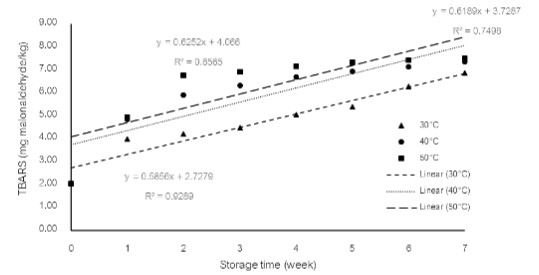Temperature coefficient (Q10) and kinetic reaction for the shelf life evaluation: case study of Homnil rice-cookies
Keywords:
accelerated shelf-life testing, Homnil rice-cookies, Q10 equation, kinetic reactionAbstract
This study aimed to determine the shelf life of Homnil rice-cookies under accelerated temperatures and humidity control 75% by using Q10 and kinetic reaction. The cookies were random sampling every 1 wk for 7 wks. Changes in physicochemical quality of cookies sample was significantly increased (p<0.05) when increasing storage time; hardness (1.4-1.9 kg), rancidity (TBARs) (2.0-7.5 mg malonaldehyde/kg), water activity (0.63-0.65) and moisture (7.1-8.8%), except for color value L* a* b* was declined. These results were clarly found in high accelated temperature at 50°C than 40°C and 30°C. Approving to the reduction scores of sensory evaluation was obtained. Whereas the total plate count (1x104 cfu/g), Coliform (<3 MPN/g) and E.coli (<3 MPN/g) were lower and safety for consumption over storage period for 7 wks. In this study, the rancidity index by using sensory score and TBARs value were choosen for quality deterioration to calculate the shelf-life of Homnil-rice cookies. At storage temperature 25°C, the shelf-life of Homnil-rice cookiess was around 60 days and 38 days when calculated by Q10 at accelerated temperature at 30°C and 40°C; and 40°C and 50°C, respectively. A shelf-life of cookies was about 22 days when evaluated by kinetic reaction.

Downloads
Published
Issue
Section
Categories
License
Copyright (c) 2022 The Journal of Applied Science

This work is licensed under a Creative Commons Attribution-NonCommercial-NoDerivatives 4.0 International License.

